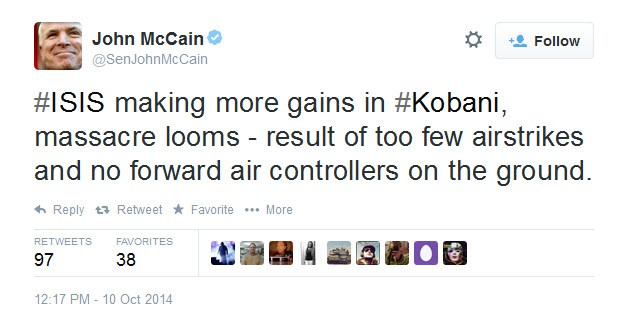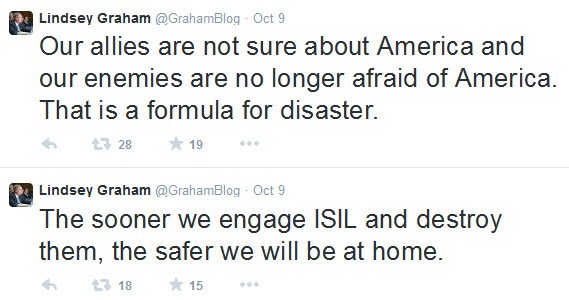Snapshots of conflict and war, policy options, opinion-makers, analyses from experts and non-experts, from the left and the right, mainstream and alternative, independent perspective of Strategic Demands…

From the Hindustan Times
These two are VERY brave and the Nobel Peace prize is much deserved in the context of previous Peace awards given figures who could hardly be described as peacemakers (Henry Kissinger?)
The emphasis on education by Malala and Kailash is key here to moving away from impoverishment, abuse, extremism and war.
[Malala Yousafzai images] [Malala Fund on Twitter]
◊
From the Washington Post by Andrew J. Bacevich
Andrew Bacevich is incisive.
As America’s efforts to “degrade and ultimately destroy” Islamic State militants extend into Syria, Iraq War III has seamlessly morphed into Greater Middle East Battlefield XIV. That is, Syria has become at least the 14th country in the Islamic world that U.S. forces have invaded or occupied or bombed, and in which American soldiers have killed or been killed. And that’s just since 1980.
Let’s tick them off: Iran (1980, 1987-1988), Libya (1981, 1986, 1989, 2011), Lebanon (1983), Kuwait (1991), Iraq (1991-2011, 2014-), Somalia (1992-1993, 2007-), Bosnia (1995), Saudi Arabia (1991, 1996), Afghanistan (1998, 2001-), Sudan (1998), Kosovo (1999), Yemen (2000, 2002-), Pakistan (2004-) and now Syria. Whew.
With our 14th front barely opened, the Pentagon foresees a campaign likely to last for years. Yet even at this early date, this much already seems clear: Even if we win, we lose. Defeating the Islamic State would only commit the United States more deeply to a decades-old enterprise that has proved costly and counterproductive.
◊
From TomDispatch by Tom Engelhardt
Engelhardt, a NY/DC writer/editor/publisher who’s been blogging away about the security state, war and peace and a bundle of hot button political topics for years is worth following. Bookmark him if you haven’t already. His site features medium-size, challenging thought pieces from a rotating group of writers not to be missed or you’re just missing some of the most incisive cut-to-the-chase writing on the Net.
[T]he background noise of the last 13 years played on. Inside the American Terrordome, the chorus of hysteria-purveyors, Republican and Democrat alike, nattered on, as had been true for weeks, about the “direct,” not to say apocalyptic, threat the Islamic State and its caliph posed to the American way of life. These included Senator Lindsey Graham (“This president needs to rise to the occasion before we all get killed here at home”); Majority Leader John Boehner, who insisted that we should consider putting American boots on Iraqi and perhaps even Syrian ground soon, since “they intend to kill us”; Senator Dianne Feinstein, who swore that “the threat ISIS poses cannot be overstated”; Senator Bill Nelson, who commented that “it ought to be pretty clear when they… say they’re going to fly the black flag of ISIS over the White House that ISIS is a clear and present danger.” And a chorus of officials, named and anonymous, warning that the terror danger to the country was “imminent,” while the usual set of pundits chirped away about the potential destruction of our way of life.
The media, of course, continued to report it all with a kind of eyeball-gluing glee… Amid the waves of fear and continual headlines about terror plots, we, the people, have now largely been relegated to the role of so many frightened spectators when it comes to our government and its actions. Welcome to the Terrordome.
◊
Interview from TruthOut / Raw Story
This from “an old left semanticist” who’s authored 100 books and for a few decades has been semantically dissecting the rhetoric of political life, the chattering class, the media and the Pentagon… Can you guess his name? He doesn’t have much of a following inside the Beltway. He isn’t seen as partisan or followed by many in positions of influence or power. In other words he is, like Ralph Nader, regarded as a dangerous sort whose raw critiques hurt.
[T]he appearance of ISIS and the general spread of radical jihadism is a fairly natural outgrowth of Washington wielding its sledgehammer at the fragile society of Iraq, which was barely hanging together after a decade of US-UK sanctions so onerous that the respected international diplomats who administered them via the UN both resigned in protest, charging that they were “genocidal.”
One of the most respected mainstream US Middle East analysts, former CIA operative Graham Fuller, recently wrote that “I think the United States is one of the key creators of [ISIS]. The United States did not plan the formation of ISIS, but its destructive interventions in the Middle East and the war in Iraq were the basic causes of the birth of ISIS….”
[T]he primary US ally over the years, Saudi Arabia, is the most radical Islamist state in the world and also a missionary state, which uses its vast oil resources to promulgate its extremist Wahabi/Salafi doctrines by establishing schools, mosques, and in other ways, and has also been the primary source for the funding of radical Islamist groups, along with Gulf Emirates – all US allies.
◊
From the Guardian
Shifting from opinion and analysis, to on-the-ground tactical advice delivered from Britain’s shores to Turkey’s doorstep.
The only way to make this partnership happen is to complete the peace process fitfully under way since 2005. All the necessary elements are in place for a breakthrough to end a 30-year conflict that has already killed 30,000 people.
◊
From Truthout
A major element in the StratDem assessment and evaluation framework has to do with ‘blowback.’ Touching on the repercussions, the costs of bombing and escalation, the calculus of war and reactions to actions, this piece is on that target. Although some still look beyond the basics of killing and revenge, cycles of violence propagate and carry on generation to generation. This opinion piece concludes with a warning not be taken without reflection. There are no “magic bombs” as this piece holds out, unless one is considering nuclear ‘bad magic’ that would horribly change all calculations. Investigative journalists (Hersh et al.) have reported on tactical nuclear weapons deployed in the region, and other news outlets have written of their useability and public sentiment.
With these air strikes, the West is playing into the hands of the very terrorist groups it wants to “degrade and destroy”… The late Chalmers Johnson explained how “blowback” works; it would be time for the United States, France and Britain to think before they act. There are no magic bombs, and blowback ensures the war on terror never ends.
◊
From Israel Hayom
As nuclear negotiations continue between Iran and the five permanent members of the UN Security Council plus Germany (P5+1), an explosion at a military site in Iran raises questions about continued special operations, sabotage, and looming threats to expand the Mideast conflict.
Report: Blast at Iran military site — intentional sabotage
Top Iranian official tells Kuwaiti newspaper, “Only a foreign state with advanced intelligence capabilities could penetrate the facility and carry out an explosion like this” • U.S. security institute says it has located damaged site via satellite imagery.
◊
From Fox News
Many commentators from the right of the U.S. political spectrum are calling for “boots on the ground” and immediate escalation to ‘ramp up’ from limited airstrikes to a full-scale war that would target, in addition to the Islamic State (IS/ISIS/ISIL), the Syrian armed forces. In effect, waging a war within a civil war. The betting odds would favor this eventuality, as many developments could push the U.S. into a wider war. Provocation is a classic tactic to draw in an opponent. Another is ‘entangling alliance’. Turkey is reportedly demanding that, for its assistance to NATO and U.S. led, recently assembled coalition pledged to fight ISIS, that a declaration of force against the Syrian Assad regime would be a necessary term of Turkey’s agreement. This in turn would draw in Iran and put a deep wedge into current nuclear talks and the newly formed Iraqi government. The escalation of conflict, some have speculated, is part of a larger game plan being carried out…
The U.S.-led coalition targeting Islamic State militants ramped up airstrikes Thursday in the Syrian and Turkish border town of Kobani as the militant group reportedly sent reinforcements into intensified fighting against Kurdish forces.
The fight for the town situated near the Turkish frontier has become a major early test for the co-ordinated campaign aimed at degrading and destroying the terror group.
U.S. officials hope it could pull Turkey into the battle against the Islamic State as a means to opening up a new front, but also fear the country might stand aside and let two of its enemies, the Kurdish fighters and the Islamic State group, fight for the town.
Turkish officials have said that while they do not want Kobani to fall, they will not take on a greater role in the coalition’s strategy until it outlines a plan that also includes attacking Syrian President Bashar Assad.
__________
_________
From Bloomberg, Op/Ed by Meghan O’Sullivan, August 8, 2014
Now, at the end of the first week of October, what began as a humanitarian mission has turned in eight weeks into a rapidly escalating regional war. After the U.S. President’s order, and without Congressional debate or formal new authorization, the war expands daily and the media and commentators across the political spectrum question why more hasn’t been done militarily across the region, as we read of calls by Turkey that the U.S. attack Assad in Syria.
As Andrew Bacevich points out in today’s Wartime snapshot, the number of countries in the Islamic world that have been invaded, occupied or bombed since 1980 stands at 14. The policies of the past clearly have fault lines. Some on the right argue for more intervention militarily, even as they argue against “linkage” and a peace agreement for Israel, a land settlement that would seem to be reachable now that strategic highlands are within Israeli orbit. The left and right continue to disagree on this issue, the mainstream has little knowledge of the countries involved in the region, most unable to even identify these nations on a map much less discuss the history or forces that have led to regional conflict and war.
The bigger picture from the vantage point of Strategic Demands is in missed opportunities and the costs that come with failed policy, costs that are not accounted for until too late. It would seem that the escalating war, conflict, reverberations, generational enmity will lock in future generations to the theater of warfare called “CentCom” and other critical security concerns will continue to be shunted aside.
Meghan O’Sullivan echoes the positions of neo-conservatives/liberals who are calling for action now and ramping up airstrikes, multi-front intervention and U.S. military mobilization in Iraq, Syria and beyond.
ISIL and its advance are not only a problem for Kurds, Yezidis and other Iraqis, but for the region and U.S. interests there. The declaration of an Islamic caliphate straddling Iraq and Syria, having control of considerable wealth and weapons, and accompanied by veiled threats to the U.S. and its allies, is not a sideshow; the potential flows of jihadists with European passports back to the West alone is a serious, looming problem.
Moreover, the possible fall of Erbil, the capital of Iraqi Kurdistan, to Islamic militants would risk the lives and livelihoods of millions of pro-American Kurds and could devastate one of the few places in the Middle East where real gains in prosperity and political freedom have been made in the past decade. Equally unsettling is the intense pressure being placed on Jordan; the conflict in Gaza is stoking the resentment among those living in Jordan, half of whom are Palestinians, while thousands of Syrian refugees continue to flow into the kingdom each day, adding to the more than 650,000 who are already there. Should the government of Jordan collapse under the strain, or should ISIS make inroads into the country, Israel could face new challenges which would make the fighting in Gaza look like a warm-up.
And that’s it for now — until next week.





Child rights activists Malala Yousafzai of Pakistan and Kailash Satyarthi of India were awarded the Nobel Peace Prize on Friday, in what is being seen as a highly symbolic push to end a decades-old rivalry between the nuclear-armed nations that have been locked in a deadly standoff along their disputed border over the past week.
With the prize, Yousafzai, 17, becomes the youngest Nobel Prize winner, eclipsing Australian-born British scientist Lawrence Bragg, who was 25 when he shared the Physics Prize with his father in 1915.
Satyarthi’s organisation, the New Delhi-based Bachpan Bachao Andolan, has been at the head of the fight against child labour, creating domestic and international consumer resistance to products made by bonded children as well as with direct legal and advocacy work.
Yousafzai was attacked in 2012 on a school bus in the Swat Valley in northwest Pakistan by masked gunmen as a punishment for a blog that she started writing for the BBC’s Urdu service as an 11-year-old to campaign against the Taliban’s efforts to deny women an education.
Unable to return to Pakistan after her recovery, Yousafzai moved to Britain, setting up the Malala Fund and supporting local education advocacy groups with a focus on Pakistan, Nigeria, Jordan, Syria and Kenya.